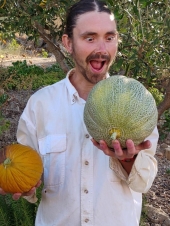
 6
6




 2
2








 1
1








Nicole Karpus wrote:Hello fellow plant lovers and permies!
I am currently volunteering at a grassroots organization in Jodhpur, India. Their aim is to empower and give support to greatly suppressed women and girls. This organization does *so* much, but one aspect I'll briefly share is that they sponsor 50 girls to live in one of their boarding homes (they have two). These girls are able to go to school and live in a safe environment that allow personal growth and peace.
I recently sat down with the founder of the organization to share an idea I had since before I even got here. I would like to establish a food garden for the girls at the boarding home to use. This would allow fresh, organic food in their boarding home kitchen and allow the girls to have another place they can safely go to. Plus, I think gardens are healing places and these girls have gone through so much. Not to mention...being able to sustain yourself is incredibly empowering.
He loved my idea and MAGICALLY already had land that could be used for this goal. So, now my dream is to build this food garden. I only have three weeks left here and then will go back home in the states. I will fundraise and research how to turn this barren land into the food garden supportive of these girls. I will then return in November to begin and execute the plan.
My first thought is I could build and heal the soil while I'm still here. Also, of course, visit this plot of land as much as possible to really read it and understand it. However, I am a newbie to desert growing!!! My experience in growing comes from the mid-west and in Guatemala. I'm trying to find people I can reach out who have sustainably healed desert-like lands. Anyone have any suggestions? Water storage and catching will be crucial as well...
Jill of all and Misses of Targets -JMH
 1
1








Spero Meliora




Lana Weldon wrote:What about disempowered men and boys? there are a lot very poor boys and men as well, also because of the caste system, but in general, poverty also definitively hits both genders. And pollution, overuse of pesticides and chemicals hits both men and women working in the fields or living in the vicinity.
Jill of all and Misses of Targets -JMH
 4
4




Lana Weldon wrote:What about disempowered men and boys? there are a lot very poor boys and men as well, also because of the caste system, but in general, poverty also definitively hits both genders. And pollution, overuse of pesticides and chemicals hits both men and women working in the fields or living in the vicinity.

| I agree. Here's the link: http://stoves2.com |








